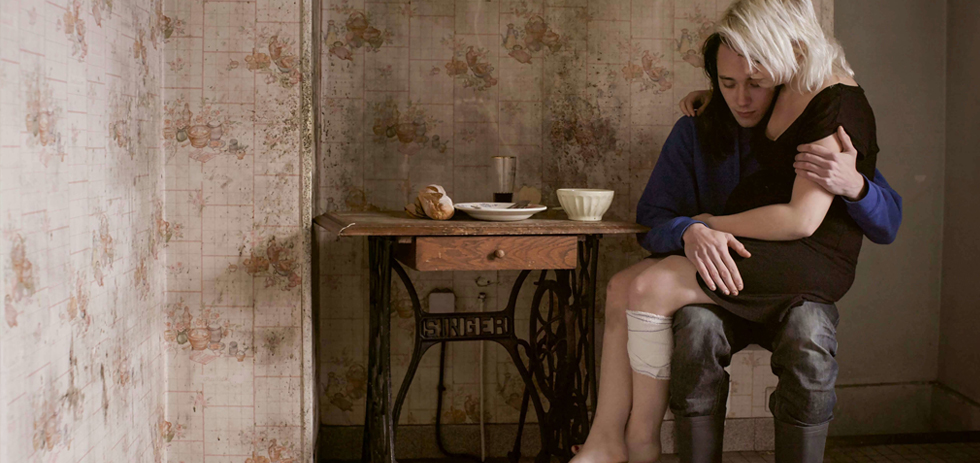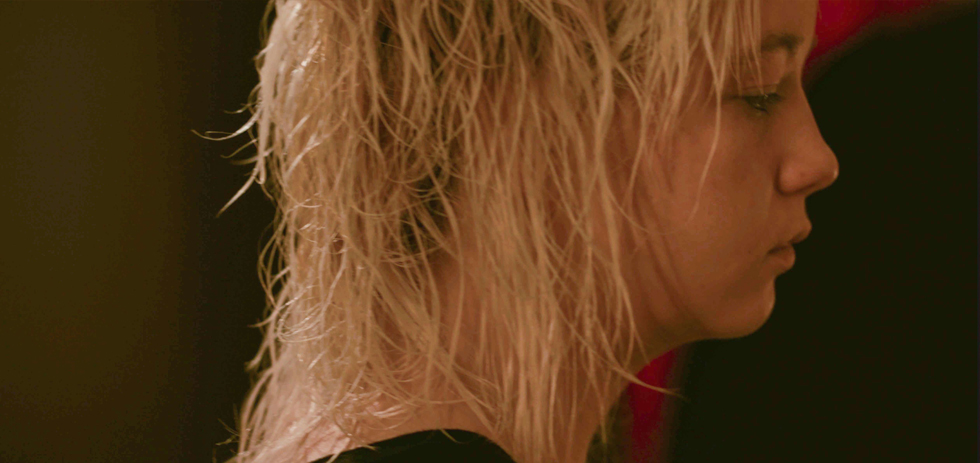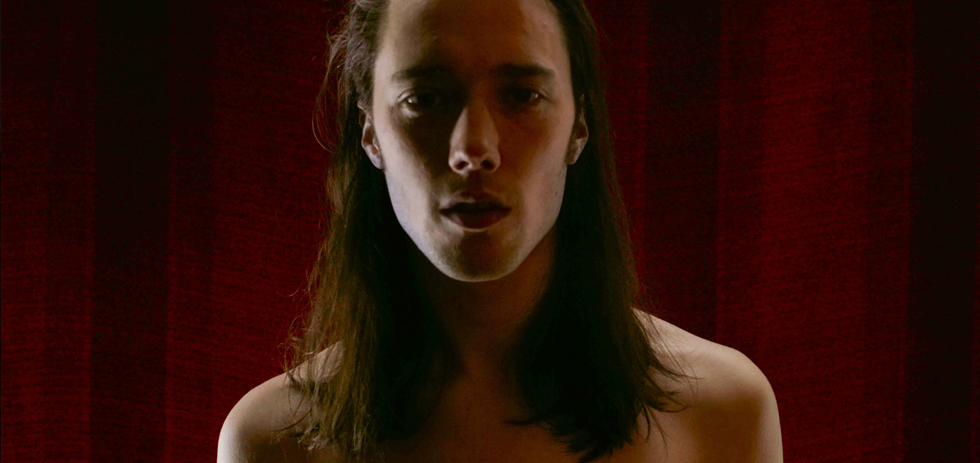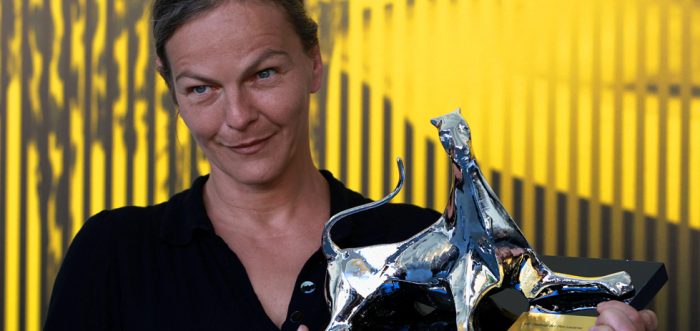When Valérie Massadian’s Nana screened at Locarno in 2011, the film was lauded as a hermetic, lucid, and unique depiction of the mysterious nature of childhood. With her sophomore feature Milla, Massadian builds upon this, creating a remarkable work through an intensely intimate approach to filmmaking. When the director appears as one of the few characters outside the pair at the core of the film, it’s a reflection of the degree to which she involves herself with her subjects. Milla moves at its own pace, and it’s all the more satisfying as a result. We caught up with Massadian to talk about the process behind writing the film, working with the two young leads, and how love informs her process as a director.
While Milla is only your second feature, there’s a clear link in the move from Nana, which focused on the experience of childhood, to a film revolving around two teenagers. When you started out on your first feature, almost a decade ago, did you plan to make your works around these periods — and is it something you intend to continue doing with your films to come?
I completely intend to. I usually ‘intend to’ in life in general, or at least, I try to. To me, it’s part of a trio, but it’s not in order. It’s all about ages: the in-between ages. Like four, where you’re a child, but you’re not civilised yet. Completely domesticated. Domesticated. That was Nana. The second one — which is now going to be the third one — is 11-12 years old. It’s another in-between age, where suddenly you’re having sex, you have the idea of body and tones of other things. After that, I wanted motherhood, but teenage motherhood. So there is a continuity there. I think every filmmaker is actually making the same film over and over again and just digging paths to get to the same hole.
I think that makes a lot of sense. You come from a photographic background, and I think that’s quite obvious in your work,with such a precise approach to framing running through every scene. The composition feels very intentional and very… clean, I think. I wanted to know how you approached writing the film not just in narrative terms, but as a piece of cinema — from a visual aspect. Does a particular element come first for you?
To me, those are completely separate. The script is to get funding for the film. I don’t open the script when I start filming. I don’t care. I know what I’m looking for.
Once you’re filming you’re not using the script anymore?
No, not at all. The structure of the film really comes once the editing begins. Completely, really completely. So it’s all about building, destroying, building, destroying, building, destroying, really. To me it’s the editing process where you write the film.
Photography, I don’t know. It’s very strange. For me it’s always about my relation to space. I walk into a space and I know there’s a maximum of three places where you can put the camera. There’s not 15 places where you can put the camera in the space. When you are filming a wall or door, there’s one place. It’s not thought out, though. The only thing that’s thought out is that these settings need to give the actors a space: like a small theatre where they can play and fill it with objects and tonnes of different things. Yes, there are still frames in film, but those still frames let life really come in and it disturb that frame. It doesn’t really have this majestic, perfect aesthetic frame thing — and to me, that style is very annoying, I think.

The way you talk about the settings, and the way you talk about the characters; it definitely carries into the film. The characters, the actors, are always at the heart of the scene. What is the process like, when it comes to working with such a small group of performers, in such an intimate work — especially without any script?
First of all, they’re not characters to me. They’re people. They only become characters on the editing table. I find them, I fall in love with them, and then I spend time with them. Because I’m more instinctive than intellectual, I understand things in their gesture, in their rhythm, in the way they behave with others, or the way they control or don’t control certain things. These can be things that they don’t even know is in their performance. Things that I know. Then, it’s not really improvisation.
I give them a situation and then it’s like music. It’s like when you’re jamming with people. I’m behind the camera, and for instance, if you take the first dialogue: the sequence where he’s counting money. All I say is, “You’re counting the money, and it’s a serious thing, and you don’t give a shit, and you’re annoying him.” That’s all I say. There’s three takes that are very long, maybe 20 minutes, 28 minutes long. The first one, both of them are laughing. Then I say, “No. You’re more annoyed.” The second one, it’s more shut down. And then the third one is the one that’s in the film.
But it’s not the 28 minutes. You have to find the moment. In Nana, everybody’s like, “Oh my God, Kelyna [Lecomte] is such a great actress.” I’m like, “Man, the girl is four years old. She’s not an actress.” In the reality, when she’s in this sequence, when she’s saying this, and you think she’s mumbling to herself and her mother is gone — dead — in the reality of the film she’s pissed at me and she’s talking to me. But that’s my problem. You don’t need to know that. That’s what I mean. The construction of the film. It all really, really comes afterwards.
Like Luc [Chessel], who plays Leo, would say, yesterday was saying something, that is very strange because it is you. It’s respecting you, as a person, and your relation to the world and others… but at the same time it’s not. It’s a completely fictional character, but it still has the essence of you. To me, that’s the most important. The most important is that I know the film is there when I know I’m not betraying them. It might sound corny and stupid, but it’s not. It’s very important to me.
How was the actual process of working with them?
First, we did a week in the summer because I was in America and I had to go for a whole year. When you say “cinema” to people they all think “Oooohhhh!”, but I needed her and others to realise that it was work, that we were going to work everyday, and that it was hard work. We did that full out and then we just shot, I don’t know, maybe 25 days or maybe two months. December and January but in the middle we stopped like two weeks or three weeks.
You’re really quite involved, from talking about writing, editing, doing the cinematography —
Locations, costuming, casting, everything.
It’s a huge amount of involvement to take on with a film. How do you sustain all of that?
Sometimes I think maybe I’m a complete control freak… but I don’t think that’s what it really is. I think, for example, the first thing always is the place. There [for Milla] it’s in Northern France. Nature is very important in my filmmaking. I wanted nature that is very beautiful, but also something that can be very dangerous. That’s what nature is to me. It’s not a postcard. It’s nature. It can be dangerous and beautiful, like a woman. It always starts there.
I find the place. Then, when I find the place, it is already giving me things. It’s sending me signs, or, whatever you want to call them. Then, I find the hotel, for example; then I find the house. When I found the hotel [in Milla], it was operating. It was actually a hotel. Then it closed. That was even better, because I didn’t care. It was a nightmare for me to film in a hotel that was working because I didn’t want to film the people who were there. I wanted to film the other side: the invisible people, the ones that work and that you never see.
Being at every stage like that is important to me. A film is like a body that you’re building. Every little detail… I mean, they’re not details. They’re very important. These spaces are important. Take that house: everything is broken, the windows are fucked, it’s by the ocean, the wind is always there. You know all this because it’s empty, and the echo and the sound is kind of strange. All of these become elements. It’s very important in the film that you build on this.

And it you draw the performances and the story from this place with quite an instinctive approach?
I don’t explain things. I don’t like to explain things to actors. I don’t explain things to anybody, not even to myself. It’s the way you’re building. It’s like building a house. When you walk in your house, in your apartment, why the fuck you put the couch there? Because you put the couch there. That’s where it fits for you. I think it’s the same thing. The construction from beginning to end has to be organic in that sense.
Yeah. It sounds like there’s a real instinct-driven way you approach your films. It’s something that was quite clear to me before we spoke. There’s an authenticity to the film, and how it carries itself that reflects that process behind it all. To me at least, the manner with which you center female characters in your films echoes that influence of your own experiences. Is it always achoice to focus your work like this?
The way I function… I’m not an intellectual, and that obviously doesn’t mean I’m stupid. I’m not — but it’s my relation to the world. My primary reaction to the world is not in thought. It’s physical. I don’t think or intend in an intellectual way. When I said earlier ‘You direct the same film’, for me, I’m working with resilience. Whether it’s a four-year-old or a seven-year-old. Maybe tomorrow it’s going to be a 12-year-old, and after tomorrow it could be anything. Even when I did the short film with my mother at 17, it came from the same thing. It’s not super political, or consciously feminist — but at the same time, it is.
I’m attracted to these women because something resonates with me. These women are not from a wealthy, bourgeois background — but they are extremely strong. At the same time, they are as fragile as they are strong. They have no voice. They are taken for granted. They’re invisible in almost every society around the planet. There’s the film, but there’s also what the film does to them outside of the work, which is really important to me.
Yesterday, [on stage, at the premiere of the film] Séverine [Jonckeere] said to me: “I didn’t realise how it changed my life. But it really changed my life. Suddenly, it changed the relation I had with my child. It even changed the relation I have with myself. I do deserve attention, and I do deserve happiness.”
These women basically think they’re piece of shit and they don’t deserve shit. Suddenly, someone comes and says: “No, you do. You do and we’re gonna do it together. Sometimes it’s going to be violent because you’re gonna have to face your bullshit — and because it can also feel like you’re going in circles — but it’s not like you’re a victim.” They are not victims. I couldn’t deal with, I couldn’t film a victim. A victim I would destroy. I know, because I’m very nasty. They are fighters and they’re very lonely in this struggle. That’s who I want to work with… because I love them; because I have this extremely primary animal tenderness where I just want to say: “Come on girl. Let’s fuck this. Let’s do it.”
I think that’s a beautiful way to describe that combination of care, intimacy, and pain that carries itself throughout the film. There’s a special degree of authenticity to it all. Yet Milla never plays to those ideas of victimhood. There’s such a trend of framing the subjects through theses lenses of victimhood.
When I make I film, I know emotionally and humanly, I know it’s gonna bring me millions of things. If I wasn’t giving back, I would feel like shit. I would feel like a vampire. That’s why I’m not like, “Oh, I’m going to do a feminine project.” No. But they become like that because that’s who I can relate to. It’s because of the way I work. It’s like a dance between each other — or sometimes, a fight.
So many films are very cruel without even knowing how cruel they are. Take, for example, when she starts working in the hotel. You have these moments where she is folding clothes or cleaning. She doesn’t know how the fuck to do it. In most films, this part would be super cruel. You’d be laughing at her. In Milla, you’re laughing or smiling, sure, but I think and I hope it comes from an incredible tenderness. She’s really trying, and she doesn’t know how to do it. But she’s really trying and she’s really caring. Suddenly, that fragility, that awkwardness, that thing that she’s not prepared for: you care for. You don’t just look at it and laugh. You don’t have this moment where you’re like “I’m gonna cry. Oh you poor little thing.” No. It’s beautiful in the way she doesn’t know how to do those things, and there’s dignity in it.

Séverine and Luc both give mesmerising performances in the film, but they’re both relatively young as actors. I’m interested in the process behind those roles, how much you worked with them, how those relationships played out off screen. I mean, you even appear in the film, in the hotel, and that act of inserting yourself into a film where other actors are so scarce feels like quite a pointed move. I think that, yeah, I was curious as to how this operated on a very emotional level; to work and develop these relationships over the course of the filming?
Oh, it stays. I mean there’s a responsibility when you film. If you’re filming an actor, I mean, that’s his job. You pay him. He goes home. He does your film, he does another one. Voila. But that’s not the case there. Those are people. Some, you come into their life with your cinema and you’re responsible. There’s a responsibility. To me, that is obvious.
Like Kelyna [Lecomte, the actress from Nana], I still see her. I go to her birthday parties. When she fucks around at school, her mother calls me. I have a responsibility. It’s not a duty, it’s a natural responsibility, because that link that is created and it belongs to us. Nobody can understand it. We can talk about it or try to explain it to 50,000 people for three hours. Nobody will get it, because like, how are you going to explain what you feel with your lover or your best friend? It’s private. It’s between you.
The character that I play in Milla shows the exact relation I have with Séverine outside of the film. Whether it’s inside or outside, I want to give the characters a key or two, something in life that helps you move forward. That’s what the character does in the film, and that’s what I think I did in her life — and she said that yesterday. I was crying and it was really ridiculous. I didn’t expect her to say it, or much even think it.
It’s a very personal and vulnerable journey — the film itself, and everything that seems to have gone into making it — to put out there; especially on the film festival circuit.
That’s why we stuck together and everybody was there at the premiere. I mean, we’re seven [the crew], so it’s easy — but they all had to be there. They only invited me and the producer, but there was no way that would happen. I said from the beginning, before I started editing, that if we ended up in a festival, everybody had to be there. They had to be. That’s what I mean by responsibility. Yeah, it’s a film, but it’s more than a film.
There’s this sense of humanity in your work, that I feel could be difficult at times to reconcile with a more critical press — whether that’s on a theoretical, intellectual or emotional level — where the films are analysed or written about in a certain way. Have you ever had trouble navigating these two, seemingly disparate worlds?
Yeah, because [otherwise] you just keep it on your shelf and you don’t show it. But… I don’t know. It’s strange. Some of the things that have been written, whether on Nana or even now, they’re not intellectual. I mean, you have the assholes that didn’t see anything and didn’t understand anything, but that’s whatever. They’re not even talking about cinema. They are talking about their personal sentiment, and I don’t give a shit about anybody’s personal sentiment as much as I don’t give a shit about my personal sentiment. If they were criticising the film as a film, I would be interested, but it’s very rare.
It’s built like a memory, so you always construct. When you tell a story that you lived, it’s not that you’re lying. You’re just saying it with different words and it’s already a different story. I think the film does that as well. People who are writing are not intellectualising it so far. You can’t. I think it’s very difficult to… You can think it and question it and think it, but I think it’s very hard to theorise on something like that. Strangely, it’s almost as if the work almost forces people to write about film and cinema; to write about politics, but on a human level. A politics of love.
One of the first texts that was written on Nana was by an American who had seen it on FestivalScope — which is really not the best. I mean, especially Nana because it’s about a four-year-old. It was really good because it forced him to write about film differently. I mean he writes nicely, really nicely. But it was very striking how the film invaded the writing. The writing was taking the shape of the film; its harshness, and its brutality in a way. It’s rawness. That’s what I mean. It was very hard to intellectualise or theorise because it’s there and it’s simple, and if you want to masturbate on it for fucking hours, go ahead. Be my guest, but leave me alone. If you cum, it’s okay.
I think that’s the perfect place to end things, but thank you so much for the interview. Milla is a really special film and I hope it does really well at the festival.
Thank you.
